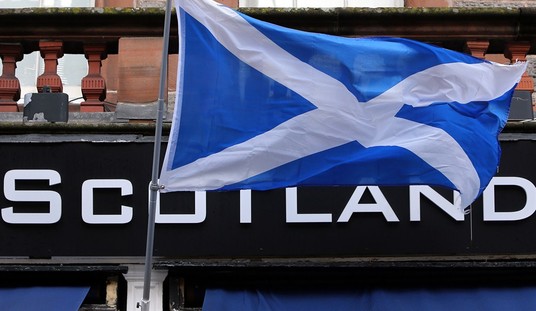One leak would be curious enough, under the current circumstances. Having both Nord Stream pipelines develop large leaks in the Baltic Sea “almost simultaneously”? Especially when it involves three separate pipes? That smells like a whodunit.
Not that anyone was using either pipeline at the moment, but perhaps someone wanted to make sure that neither could be used ever again:
The authorities are trying to determine the cause of leaks in two gas pipelines running from Russia to Germany under the Baltic Sea after both experienced a sudden drop in pressure, German and Danish officials say.
Neither of the pipelines, Nord Stream 1 and 2, had been active, but both were filled with natural gas when they experienced a sharp drop in pressure on Monday, which the authorities said could only be caused by a leak.
“There must be large holes; otherwise pressure would not fall so quickly,” Fiete Wulff, a spokesman for Germany’s network agency, said on Tuesday. “There is no other way to explain it.”
The pipelines have been a focal point of the broader confrontation between Russia and Europe. After the European Union imposed economic sanctions on Russia to penalize it for invading Ukraine, Russia began withholding the natural gas that for decades it had abundantly sent to Europe, threatening its energy supply as winter looms.
Two pipelines but three pipes, the Washington Post notes:
The leaks had no immediate impact on energy supplies to the European Union but raised concerns about serious environmental damage from methane, a greenhouse gas that is a major contributor to climate change.
“The damage that occurred in one day simultaneously at three lines of offshore pipelines of the Nord Stream system are unprecedented,” the company, Nord Stream AG, said in a statement to Russian state news agencies.
Two of the damaged pipes are part of Nord Stream 1, normally a major transmission line of Russian natural gas to Europe, while the third is part of Nord Stream 2, which Western nations have blocked from becoming fully operational as part of sanctions over Russia’s war in Ukraine.
Bloomberg reports this morning that, um … no one knows much about what happened yet. One would think that the idle status of both pipelines would have no impact on markets, but Vanessa Dezem points out that it might have some impact on market psychology in an already fraught investment environment:
The prime minister of Denmark apparently doesn’t believe in coincidences:
The Danish prime minister said Tuesday that she “cannot rule out” sabotage after three leaks were detected on Russian natural gas pipelines running under the Baltic Sea to Europe. Premier Mette Frederiksen spoke after simultaneous problems were reported with the Nord Stream 1 and 2 pipelines that were not bringing gas to Germany amid an energy standoff caused by Russia’s invasion of Ukraine, but were still filled with the fuel.
She spoke at the inauguration of a new pipeline with Norwegian gas meant to help wean Poland and Europe off Russian supplies. …
The Danish Maritime Authority issued a navigation warning and established a prohibited area with the aim of ensuring that ships do not sail near the leaks. Ships may lose buoyancy if they sail into the area, and there may also be a risk of ignition above the water and in the air, the Danish authorities said. Swedish authorities sent out similar warnings.
The leaks in the pipelines were detected northeast and southeast of the Danish island of Bornholm.
The BBC picks up on reports in German media that officials in Berlin are not ruling out an attack on the pipelines. They also report that Kremlin flack Dmitry Peskov issued a statement declaring Russia “extremely concerned” about the leaks, and also suggested it might be deliberate. At the moment, three countries are conducting investigations into the incidents — Germany, Denmark, and Sweden.
If it was deliberate, the question becomes cui bono? Who benefits? The Russians would looove to blame this on Ukraine, but it’s difficult to see why they would have bothered at this stage. The EU has sanctioned Russian gas imports already, and it was Russia that turned off Nord Stream 1 after Germany shut down certification and use of Nord Stream 2. Ukraine is focused on fighting Russians and have their hands full with the task of liberating their territory. If Ukraine was inclined to conduct sabotage outside of that theater, they would have aimed at Russian gas facilities — or more likely, actual military facilities in Russia — rather than the pipelines in the Baltic Sea, which are a trickier if less guarded target.
What about Russia? That would be a case of cutting off one’s nose to spite one’s face, but that doesn’t exactly eliminate Vladimir Putin from consideration, especially lately. Putin seems determined to give himself repeated nose-ectomies in desperate hope of avoiding humiliation at the hands of the Ukrainians. Still, it’s tough to see what Russia gains by sabotaging the pipelines that would usually produce massive revenues for Gazprom. Eventually, the war will be over and Russia will need that income more than ever.
So … who else could it be, assuming it’s really sabotage and not just a nautical accident? It would appear that the purpose of this was to ensure that the EU stopped importing Russian gas on a more permanent basis, so if we work backward from that, the obvious suspects are … practically everyone with a brain. Eastern European countries, Western European countries, the US — everyone except Germany, really. Even outside of state actors, you could argue a case for environmentalists, Antifa, rogue militias, and so on. The dividing line here is expertise and resources for such a complicated operation, which tends to keep it within the state-actor sphere.
And even then, the only states with a real vested interest in making sure Russia can’t sell its gas in the future no matter the outcome of the war are Ukraine and the Baltic nations that would be next if Russia succeeds in its war. They won’t be anxious to see Russia rearm and train a million-man army for Operation Slavicide II. The best way to prevent that is to eliminate Russia’s sources of revenue. Follow the money, in other words.
At this point, it’s really anyone’s guess, and that assumes this was actually sabotage and not some sort of large-scale nautical accident. Maybe we need a Hercule Poirot to figure this out. Or, perhaps, everyone involved may see more value in ambiguity. Bet on the latter.
Update: Bloomberg now hears from one German official that the damage came from a “violent act” and not a failure:
Germany suspects the damage to the Nord Stream pipeline system used to transport Russian gas to Europe was the result of sabotage.
The evidence points to a violent act, rather than a technical issue, according to a German security official, who asked not to be identified because the matter is being probed. In response to the pipeline leaks in the Baltic Sea, Denmark is tightening security around energy assets.
It’s not clear whether this alert on Twitter is based on the same report:
BREAKING: German authorities believe Nord Stream 1 damage is due to sabotage
— The Spectator Index (@spectatorindex) September 27, 2022
No one’s going to buy a coincidence anyway.








Join the conversation as a VIP Member